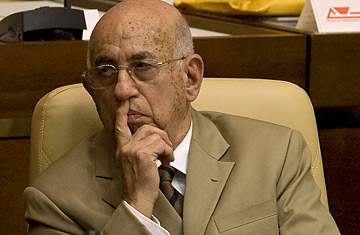
The new first vice-president of Cuba, Jose Ramon Machado, listens during the Cuban National Assembly in Havana, February 24, 2008.
There was no surprise, Sunday, when Cuba's parliament elected Raul Castro, 76, to succeed his ailing, 81-year-old brother, Fidel, as President. But pundits who had expected an infusion of youth into Cuba's Paleolithic hierarchy were roundly disappointed. The six vice presidential posts, for example, were taken by a group of men whose average age is 70 — including 77-year-old, hard-line communist ideologue Jose Ramon Machado as First Vice President.
Machado's election technically makes him the No. 2 man in Cuba's government, but many in and outside of Cuba were left wondering whether Raul isn't, in fact, the real numero dos — to Fidel, who resigned as President last week but could continue to pull the strings until, as he hinted in his resignation letter, "my last breath." In his inaugural speech, Raul did emphasize that his priority would be to make Cuba's sclerotic system more efficient and open in order to "satisfy the basic needs of our population, both material and spiritual, starting with a sustained strengthening of our national economy and its productive base." But, as if cowed by the shadow of big brother, Raul insisted that only Fidel could be considered Cuba's true commander-in-chief. "We all know it," he admitted while adding that all major official decisions will continue to be vetted by Fidel.
No one expects Raul, himself once known as a communist hard-liner, to be Mikhail Gorbachev. But the less charismatic Raul is considered more pragmatic than his brother, and had been making perestroika-style noises since taking over as interim President after Fidel underwent major intestinal surgery 18 months ago. As a result, now that Raul has full presidential powers, many Cuba watchers had expected younger faces to emerge — widely anticipating, for example, that Raul's reform-minded economy czar, Carlos Lage, who in relative Cuban terms is a positively teen-aged 56, would become First Vice President. Lage instead remained as a subordinate Vice President. Meanwhile, hard-liners such as National Assembly leader Ricardo Alarcon, 70, whose stars were thought to be fading like the paint on old Havana mansions, remained aloft in Cuba's communist firmament. (Alarcon was reelected as the Assembly's speaker.)
Raul's Sunday strategy was clearly meant to tamp down reform expectations —which the younger Castro, who has nudged Cuba's moribund economy toward capitalism and encouraged more open debate about its totalitarian politics, may have felt were rising too quickly for him to meet in the wake of Fidel's exit. "Raul has to proceed cautiously," concedes Brian Latell, a Cuba expert at the University of Miami and author of After Fidel. "In the past 18 months he has elevated popular expectations. Now he has to manage them."
Cuba analysts like Latell still believe Raul will pursue economic if not political restructuring. Machado, a doctor who served as a medic to the Castro brothers' rebel army and has been at their side since Fidel took power in 1959, may be a geriatric hard-liner, but he is also one of Raul's closest confidantes and may help his reforms navigate the minefield of Fidelista resistance during the early stages of Raul's rule. Those changes are expected to include broadening private enterprise, especially in the agriculture and service sectors — institutionalizing profit-oriented farmers' markets, for example, and letting families run more varied small businesses.
Raul may also be delaying deeper reform until a Communist Party congress can be held in Cuba late this year or early in 2009. Fidel still holds his post as head of the party, and Sunday's results were a reminder that its power clearly rivals — if not exceeds — that of Raul's position as head of state. If Raul and his allies can wrest that clout from the Fidelistas, change in Cuba is expected to have more breathing space. Until then, it stands to look more like an old man who needs a canister of oxygen.
—With reporting by Dolly Mascarenas/Mexico City
